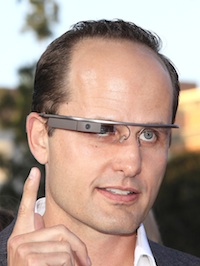Proper Use of Google Glass Respecting Law and Privacy Will be All About Context…
Recent news stories had two very different takes on Google Glass. One told of a woman pulled over for speeding being issued an additional ticket for distracted driving because she was wearing Google Glass. The second warned employers of Google Glass in the workplace citing distraction and legal concerns such as laws against recording conversations and collecting personal information. Then I wondered what I’d do if I saw someone walking down the sidewalk with their Glass on. Would I duck into a shop? Proper use of Google Glass respecting law and privacy will be all about context.
Context is different depending where you are. Are you in a public place, a private place, or a restricted place like a government installation? Context is different depending on what you are doing. Are you sitting at your desk, walking down the street, speaking with a co-worker, or operating a vehicle? And context differs depending on what you have enabled on your Glass. Are you recording video and/or audio, receiving text messages, surfing the web, or following driving directions?
 |
| A man is seen wearing Google Glass at the premiere of ‘The Internship’ at the Regency Village Westwood on May 29, 2013 in Los Angeles, California (Photo Credit: Joe Seer) |
Now let’s layer on some laws starting with the law on recording videos. You can’t video and take pictures of folks in places where they have a reasonable expectation of privacy, such as in their bedroom, without their consent. In 12 states, you can’t record conversation without all parties consenting to the recording. State law generally prohibits televisions or video screen visible to the driver but for phones, GPS and back up camera. Lots of states prohibit texting and driving.
When we combine context and law, we get a better picture of the complexities of wearing Glass.
Scenario 1: Sipping a latte in coffee shop while reading the paper: You’re pretty safe here, but you need to turn off any audio recording in those 12 states requiring all party consent to the recording of conversation just in case you pick up chit chat from a neighboring table.
Scenario 2: Running for a plane in a terminal: You’re in a public place so you can video. As long as you’re moving swiftly, you’re not picking up conversations. But TSA will shut down video being taken of areas beyond checkpoints. And because they are linked to your phone, they won’t do you much good when you power that down for take off.
Scenario 3: In the office: As a General Counsel, I would not care to see Glass in the workplace for two reasons. The first is employment law. Employees sue their employers all the time for things one employee does to another employee. I’d worry about increased litigation with the ability to turn on record mode at any time. People say and do stupid things, and many are best left to a fading memory. The second reason is electronic discovery during litigation. The burden to hand over massive amounts of electronic information during the discovery phase of litigation is hard enough without having to poll Glass wearers for any recordings they may have.
Scenario 4: Driving your car: Now this one gets fun. I’d love to have my driving directions right there in front of me rather than glancing down at my phone to see how far it is until the next turn. But that’s tricky if I can’t have a screen in front of me. The funny thing is that law always lags technology. Massachusetts’ law says, “No person shall drive any motor vehicle equipped with any television viewer, screen or other means of visually receiving a television broadcast which is located in the motor vehicle at any point forward of the back of the driver’s seat, or which is visible to the driver while operating such motor vehicle.” Television, remember television? Could an officer say Glass is a television? If they can’t, they might write you up for “Distracted Driving,” like the lady in California. The issue is still up in the air as heads up displays are installed in cars projecting onto windshields.
Even if we get past the no screen or television rule, there are state bans on texting and the use of a phone by junior drivers. You may tell the officer that you were only using Glass for navigation. Tell me how that works out for you.
Scenario 5: Having dinner with a friend: Put down the law book and pick up Miss Manners on Etiquette for this one. Electronic devices have no place in intimate personal gatherings. Daresay, I shan’t ever dine with a person donning their Glass.
It’s really all about context. Every tool has proper and improper uses. Turns out there are legal and illegal uses as well. I’ve seen Glass demonstrated by a law professor who makes marvelous use of them in class as he sees questions stream through as texts. I’d like to have Glass for skiing so I can take movies and keep tabs on the kids. They’re a great idea, but there will be a time and a place.














